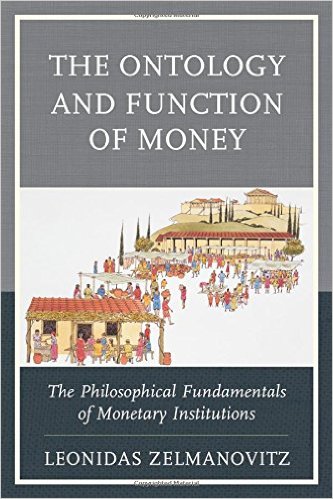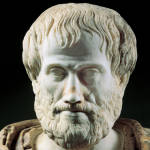 Leonidas Zelmanovitz is a philosophical economist with a new book out: The Ontology and Function of Money: The Philosophical Fundamentals of Monetary Institutions. It’s a a rich book, as Zelmanovitz includes discussions of all the major economists and philosophers whose thinking bears directly on the issues and puzzles of money.
Leonidas Zelmanovitz is a philosophical economist with a new book out: The Ontology and Function of Money: The Philosophical Fundamentals of Monetary Institutions. It’s a a rich book, as Zelmanovitz includes discussions of all the major economists and philosophers whose thinking bears directly on the issues and puzzles of money.
Earlier, I posted an excerpt in which Zelmaovitz connects the Aristotelian solution to the so-called naturalistic fallacy to the question of the value of money:
“This approach hints at the fact that a key element in this work is the treatment given to questions surrounding the ‘naturalistic fallacy.’ The basic reasoning here is that in regard to the specific needs of proper human life, or any life for that matter, there are some instruments of teleological value and, therefore, in regard to living beings it is possible to avoid a naturalistic fallacy,  since what they ‘are’ is already impregnated with values about what is proper for them, about what they ‘ought’ to be. In the same way, that exception to the fallacy of deriving an ‘ought’ from an ‘is’ applies to what is instrumental to living beings to realize their potential. In society as we know it, money is one of those things that is instrumental for living a proper human life” (p. 2).
since what they ‘are’ is already impregnated with values about what is proper for them, about what they ‘ought’ to be. In the same way, that exception to the fallacy of deriving an ‘ought’ from an ‘is’ applies to what is instrumental to living beings to realize their potential. In society as we know it, money is one of those things that is instrumental for living a proper human life” (p. 2).
Prof. Hicks, it appears that this new book might be a budget-buster (unless Collection Development is listening…) – this might be a useful introduction to the author’s work:
Zelmanovitz, L. (2011). Money: origin and essence. Criterio Libre, (14), 65-90.
http://dialnet.unirioja.es/descarga/articulo/3696814.pdf
– thanks to Google Scholar!
It’s definitely expensive. Thanks for posting the article link.